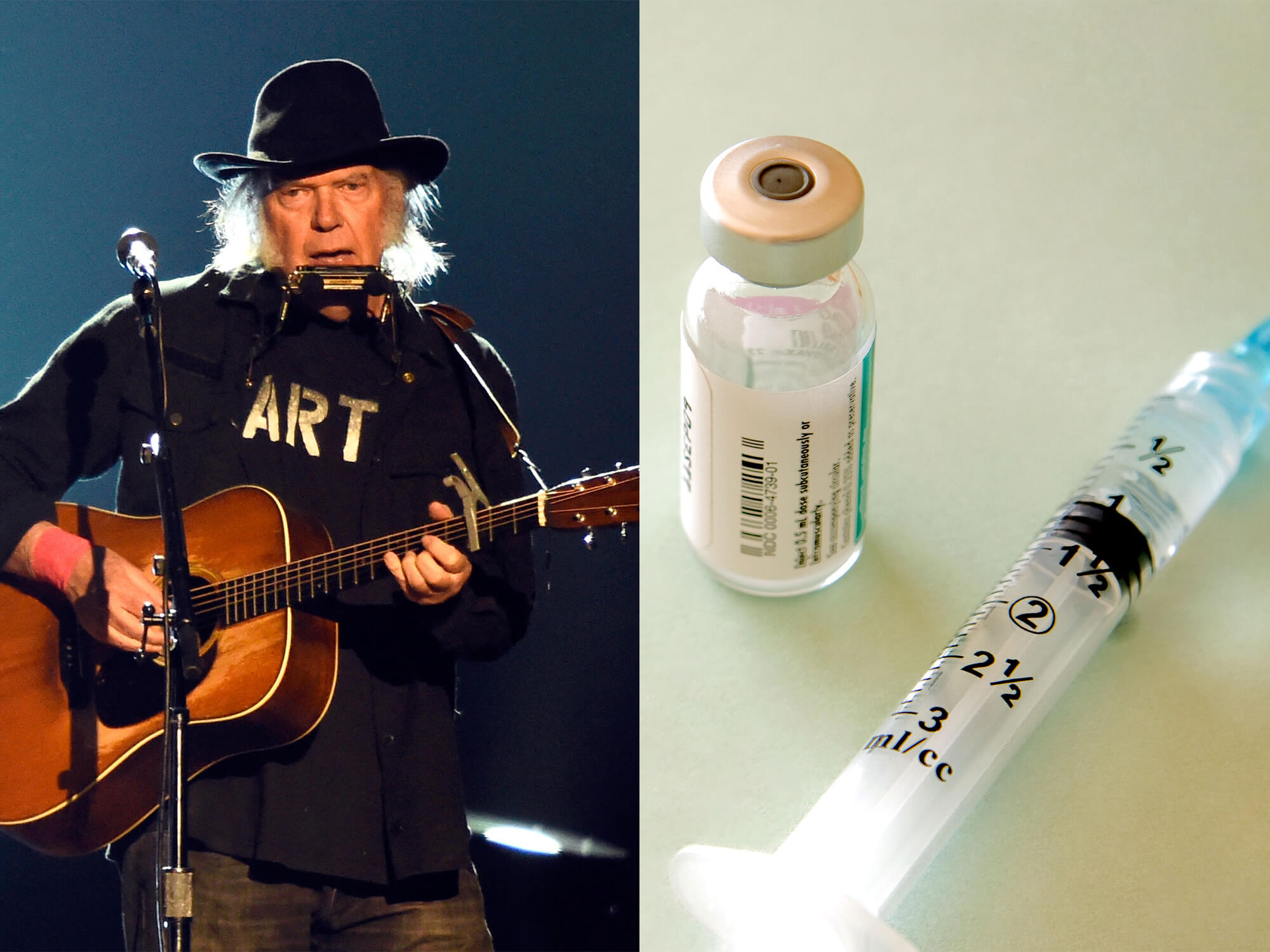No, Pfizer isn’t responsible for Neil Young’s catalogue, or his Joe Rogan protest
Neil Young’s catalogue is in fact owned by a secret society of shape-shifting lizards from the centre of the Earth – oh, wait, that’s also false.

Images: Frazer Harrison / Getty / Julia Hiebaum / Alamy
In a turn of events fairly unique to 2022, Neil Young has had to clarify that a pharmaceutical company is not responsible for his music catalogue, after he pulled it from Spotify in protest against vaccine misinformation hosted by Joe Rogan.
Young found himself at the centre of a bizarre conspiracy that attempted to link Hipgnosis Song Management with Pfizer. Hipgnosis owns a 50 per cent stake in Young’s catalogue. In turn, the investment firm Blackstone possesses an ownership stake in Hipgnosis. Blackstone hired Jeff Kindler as a senior advisor in 2020, who had previously been the CEO of Pfizer. Kindler left the role over a decade ago, in 2010.
This loose web of connection was enough for some to speculate that Neil Young didn’t make the decision to take his music off Spotify himself. Instead it was made by an investment firm in the pocket of Big Pharma, exercising its leverage over Young to protest against truth-seeker and horse-dewormer-advocate Joe Rogan.
In a new letter posted to the Neil Young Archives, Young clarified a previous erroneous statement he had made regarding a petition against Joe Rogan and Spotify (it was signed by over 270 medical professionals, including nurses and hospital assistants, not 270 doctors). He also clarified that no, Pfizer was not behind the decision for him to remove his music from Spotify.
It reads: “The letter that prompted me to act on Spotify was written by 270 medical professionals, not doctors. I erroneously said they were doctors after having read disinformation on the internet. About a third of them were doctors. But many of the rest were nurses and hospital assistants. I respect and honor all those people and the work they continue to do as I write this.I read their whole letter.
“I still support them. My mistake was calling them all doctors,” Young wrote, before quoting an early version of a Guardian headline which states the letter was written by 270 doctors. “So I was misinformed too!” Young added. “Glad it wasn’t a life and death decision for me.”
“Also FYI,” he continued, “to clarify more bad misinformation online that is used to make points against me in some of the letters included here: The publishing share Hipgnosis has in my copyrights is in the Hipgnosis Songs Fund that is publicly traded on the London Stock Exchange.
“The Blackstone investment went into a separate Hipgnosis Private Fund and none of that money was used for the Hipgnosis Songs Fund. Pfizer has not invested in Hipgnosis but a past Pfizer CEO is a senior advisor for Blackstone…
“So much for Big Pharma! So much for PHARM aid! Clever but wrong.”
Young closed his letter off by asking his fans to “Be well, Love earth.”
If Pfizer truly was behind the removal of Young’s music from Spotify, it would mean accepting that Kindler deliberately persuaded Blackstone/Hipgnosis to obtain Neil Young’s catalogue specifically for the purpose of protesting Joe Rogan to benefit a pharmaceutical company he had left 10 years ago. This would have to be the case, as Pfizer does not currently own a stake in Neil Young’s catalogue – or any musicians’, as it is a pharmaceutical company.
As Snopes put it: “The claim that the pharmaceutical company ‘owned Young’s music catalogue’ was patently false, and the theory of a fantastical web of corruption, with Kindler at its centre, was presented without any concrete evidence and, perhaps more importantly, made no sense whatsoever.”
